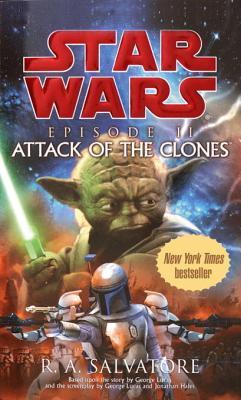What do you think?
Rate this book


368 pages, Kindle Edition
First published May 1, 2002
This was a decent novelization. There are parts that I wish were better, and there were parts that really improved my understanding of the movie. Overall, it was enjoyable and I'd probably rate it 3.5 stars, but I'll be generous and rate 4.

 Loved this filum - six stars HUZZAH! A couple of things that though - that sabre fight twixt yoda and Christopher Lee strongly reminded me of Gandalf v Saruman (Christopher Lee again!), and Ani's father is still to be identified.
Loved this filum - six stars HUZZAH! A couple of things that though - that sabre fight twixt yoda and Christopher Lee strongly reminded me of Gandalf v Saruman (Christopher Lee again!), and Ani's father is still to be identified.The plot, as previously known, is that of the second instalment of the prequel trilogy. It is not strictly of Space Opera due to its lack of machismo factors, shooting and starships fighting, which many deemed to be somewhat a disappointment although it's in fact beneficial to humanity, considering testosterone filled sci-fi media sphere of the present days. Or rather it did not satisfy self-righteous nostalgic fans or elitist sector of Star Wars fandom. This novel with the imagery of Coruscant especially the underbelly almost reads like a Steampunk on top of Epic Fantasy which I personally find to be satisfying as a reader who's into those and not Space Opera.
The film novelisation or this book, apart from screenplay novelised obviously, offers off-screen storylines & dialogues which makes more sense to the story. Off-screen dialogues and explanation also make non-human characters who do not speak in Basic in the film less alienated and more relatable for instance the Kaminoans and Geonosians.
On to an aspect that is rather problematic this word is a nuisance. It appears as if the Tuskens is a result of a xenophobic discourse, or racist rather, or even orientalist. An indigenous group whose resources were exploited by settlers therefore needed to go on raiding. How logical. The author needed not to make them physical threatening or impulsive to justify their raiding because the cognitive logic enough will do. It's shady and dodgy but the author made it obscure enough to duck a criticism or a seriously analysis on this.
On to the feels. Obi-Wan and Typho smell bullshit from a distance yet they let it slip. How wise of grownup experienced professionals. The big doom partly is their fault from poor supervising. Yoda I'm looking at you also. Jango and Boba relationship as parent & child is very well established in the book and is one of the parts that are most enjoyable. Many couldn't help rooting for them. What appears in the film of Jango and Boba is just a tip of an iceberg in comparison to what appears in this book.
"Don't do that!" Obi-Wan screamed. "I don't like it when you do that!"
"So sorry, Master."
"Slow down!" Obi-Wan ordered. "Slow down! Don't go through there!"
But Anakin did just that, banking left, right, left.
"What are you doing?"
"Sorry, Master!"
Anakin took them up and around, finally settling into a hover some fifty stories from the street.
"Well, you lost him," Obi-Wan said.
"I'm deeply sorry, Master," Anakin replied.
"Patience," Obi-Wan said. "Use the Force, Anakin. Think."
"Sorry, Master."
"He went in there to hide, not run," Obi-Wan reasoned.
"Yes, Master."
Obi-Wan held the lightsaber out toward his student. "Next time try not to lose it."
"Sorry, Master."
Obi-Wan pulled the precious weapon back as Anakin reached for it, and held the young Padawan's gaze with his own stern look. "A Jedi's lightsaber is his most precious possession."
"Yes, Master."
"He must keep it with him at all times."
"I know, Master."
"This weapon is your life."
"I've heard this lesson before."
"But you haven't learned anything, Anakin," the Jedi Knight said, turning away.
"I try, Master."